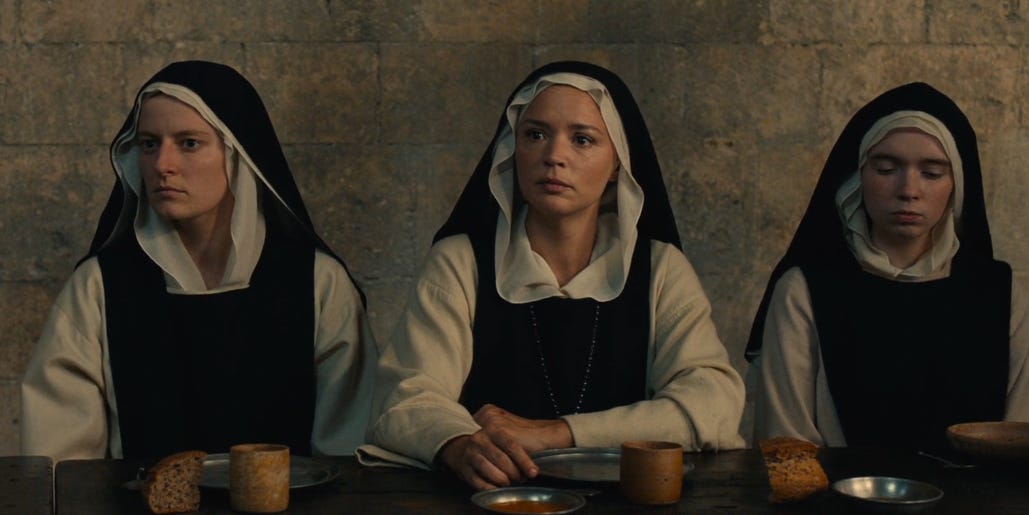REVIEW: Benedetta (2021)
They say sex sells, but don't be fooled by headlines and movie posters. Let it be clear: This is not a PornHub special
Benedetta tells the story of a nun who claims to be Jesus’ wife. She daydreams that Jesus saves her from danger, just like a knight saves a damsel in distress in fairy tales. In her depictions, Jesus is portrayed as a (feminine?) man that looks like a fresh-out-of-the-wardrobe actor coming out of a YouPorn biblical satire, whose more than ready to make Benedetta kneel to give her the 'holy sacrament' (if you know what I mean). But for that, you will have to pay for a premium subscription. This is the free version, you cheap bastards.
It’s clear that Paul Verhoeven (writer-director) doesn’t want to go that far, keeping the alleged 'visions' with Jesus (and certain implications) to a minimum. Instead, he decides to graphically highlight the lesbian aspects of the story, based on the 'non-fiction' book by Judith C. Brown, Immodest Acts: The Life of a Lesbian Nun in Renaissance Italy (Oxford University Press, 1986), by showing, for instance, provocative same-sex scenes with a hand-made dildo—carved of a Virgin Mary wooden figure that becomes Benedetta’s sex toy.
If all this 'sacrilege' stimulates your senses, let me warn you: Don’t be fooled by click-bait headlines and review pull-quotes. You can expect moderate nudity (wiggling boobies and booty, and pubic hair that looks suspiciously depilated for a 17th-century setting) and one same-sex scene that is basically oral sex. Both 'visions' and sex scenes are kept to a minimum. Most of the running time is dedicated to expose the social dynamic inside the 'convent' through the catalyst of Benedetta’s 'holy' claims and apparent 'miracles' (she sometimes speaks like a possessed woman and bleeds from stigmata). Whether these 'holy' acts are real or simply Benedetta’s fabrication is not the point. They’re a McGuffin. And their validity won’t be answered.
The movie makes it clear that there’s a possibility that it’s all part of a hoax and Benedetta is just doing a power play (take one of the first scenes and its implication, where we see Benedetta as a child the day she is admitted in the 'convent'; one of the nuns tells her that she is "intelligent" and "intelligence can be a dangerous thing"; or the piece of ceramic we see two times after the stigmata, casting doubts about the 'divinity' of her wounds). Regardless, Benedetta is quickly made the head of the 'convent', which gains her some enemies who don’t believe her claims, up to the point of bringing a member of the clergy all the way from Florence to settle the matter.
The film portrays the complexities of human behaviour intermingled with religious duty and devotion, where we see, for example, the former abbess Felicita (Charlotte Rampling) almost confessing that she chose a religious life as a form of escape from her past, similar to Bartolomea (Daphne Patakia), who was sexually abused by her father and brothers and found refuge at the 'convent'. Even sister Christina (Louise Chevillotte), who is convinced that Benedetta’s 'miracles' are a hoax, knowingly lies to achieve her goals.
The film could be interpreted as a 'hit piece' on religion hypocrisy, but it also has parallels to today’s 'virtue-signal' world. Even so, it’s refreshing to see women on-screen that 'feel' more 'real' than most of the current Hollywood propagandist material that plagues multiplexes. At the moment, where else can you see two women taking a dump on a latrine and wipe their asses with straw? (with 'award-winning' sound effects when one of them relieves herself).
Overall, part of Verhoeven’s film style might put off some people (the comet scene, the visions, etc.), but it’s consistent enough with the phony atmosphere underlying Benedetta’s claims. However, there’s another movie (Romanian) with strong parallels to this one; less sexy, less stylistically 'comic', but with a harrowing and long-lasting effect: The brilliant Beyond the Hills (Dupa dealuri, 2012), which is also based on a real account. They could make a good double-bill, with Benedetta as the entry course and Beyond the Hills as the main meal. Give it a try.
Related Content:
I strongly suggest to never shape your perception and understanding of historical events based on a fictional work as your primary (or worse, your only) source. I always encourage my readers to watch movies (if possible and fit for purpose) in its original language with optional subtitles (the lesser of two evils). In case you missed it, this week I also reviewed the documentary The Last Blockbuster, which you can check out here.

